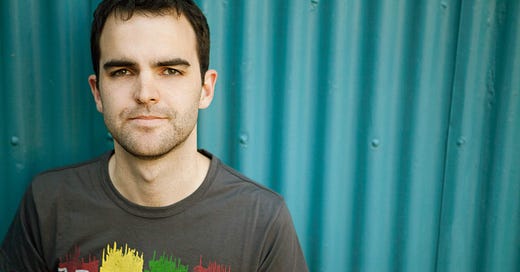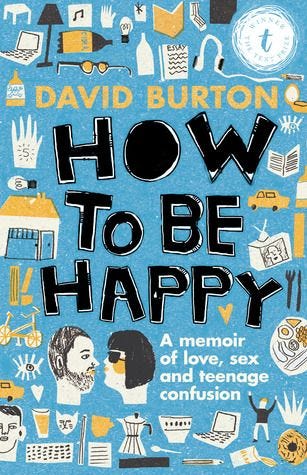This is the story of how I accidentally ended up writing a memoir, and then accidentally traumatised myself, then accidentally ended up adapting the trauma into a play that was never staged.
In 2007, I was twenty and gay. I was making out with dudes and writing plays about gay rights. In the spirit of this homosexuality, the headmaster from my old high school invited me to talk to graduating seniors as homo inspo. I obliged, writing my life story (disabled brothers, struggles with mental health, salvation in sexuality, seduced into attempted suicide) and delivering it. I’d never experienced anything like the response I enjoyed. Dozens of teenagers wanted to talk to me. Something I offered was resonating. And it made me feel validated and seen. Like everything I’d been through served some higher purpose.
I was invited back the following year. But I had one problem. I’d fallen in love and lust with a fabulous woman. Never mind, said the Catholic High School headmaster, we don’t care. It’s all part of the rich tapestry of your life!
I was invited back every year for the following dozen or so years. The speech became polished and refined. I mined my personal trauma for laughs and moments of sweetness. I recalled the time another kid strangled me and played it as a gag. I swept over the moment I was assaulted in a locker room as a minor plot point. The dense, ugly and shameful relationship I had with my parents during my adolescence was shaped into a plot point that evangelised them free of any blame and presented myself as a shitty son. My eventual suicide attempt was shaped into the climax of a hero’s journey type narrative.
I was young and enjoyed being validated. And I was genuinely helping a bunch of other queer, young, vulnerable people. That felt good.
I also desperately wanted to be a published writer. The underlying mechanics of my depression were still present, and I was desperate for validation. I thought I would find it in becoming a ‘legitimate’ writer.
My works of fiction tended to be didactic, earnest, and soaking in a search for praise. I wanted to be clever and literate and adult. I applied for my Masters in Creative Writing with a plan to finish my novel about a Christian afterlife that collapsed with the uprising of a secular messiah who killed Jesus Christ. I was exhausted by the premise before I stumbled over a dozen thousand words. With limited time to deliver my outcome, I expanded my life-story speech into a short memoir.
I accidentally had a book for young adults. I submitted it to the Text Prize in 2014 and was utterly floored when it won. For a couple of years after its publication, I would receive fan mail from struggling teens and deliver my stand-up comedy inspirational speech to thousands of teenagers. I was buoyed by the validation, but each time I delivered it, something else was taken from me…although I couldn’t articulate what.
In 2015, Wesley Enoch commissioned me to write my first main stage theatre piece for Queensland Theatre Company. St. Mary’s In Exile wasn’t perfectly written, but it was a hit. By the time it ended its run, Wesley had finished up at QTC, and I was in conversation with the new AD, Sam Strong. I pitched him a handful of works. He feigned polite interest. Then I mentioned my memoir, and he perked up. He commissioned me to adapt How to Be Happy.
Sam would end up staging many adaptations for young adults during his time at Queensland Theatre. All were smashes: Storm Boy, Jasper Jones, and later Boy Swallows Universe. I suspect he greatly overestimated the literary success of How to Be Happy, which was minuscule compared to those giants. Plus, by the time I delivered my final draft, it was 2018. The #metoo movement was in full force, and for the company to stage an autobiographical work about a straight white dude felt understandably tone-deaf. At least, that’s what I assumed the issue was. The company didn’t reply to my e-mails for about a year, and the play died.
More distressing for me was my growing relationship with the memoir. In 2016, on the eve of becoming a parent, I slumped into a fresh depression, and I found a new narrative for my adolescence. It wasn’t inspiring or amusing. Tales of abuse I’d wholly erased from the memoir emerged afresh. Now, in a safe and secure marriage, my extremely low self-esteem was uprooted and examined and I found purchase in dark and lonely memories.
The memoir now felt false and contrived. And I didn’t feel particularly safe in giving the speech. Despite beautiful and personal messages of love for the book, I held onto a group of negative reviews from GoodReads, typically from young women, who found me personally revolting.
But the play, I always felt, was good. It was engaging, well-written and had potential. I imagined a new way to deliver it that felt theatrical: an ensemble cast would all take turns playing versions of ‘myself’, and narrate the entire experience. This meta-theatricality put more distance between me as author and me as subject. I became my own Brechtian quagmire. With that distance, I could play more with the material.
It would cost money to produce the work properly, which was another turn-off for any producing company. That’s a point I find frustrating - I’ve had countless conversations with ADs who encourage me to ‘really take the lid off’ and ‘explode’ a work, only to be told later that my cast of five and imaginative design would be too expensive.
I still can’t bring myself to re-read the book of How to Be Happy, but the play remains an interesting little enigma in my career. When people ask me about writing a memoir, I find it difficult to reply. The idea that ‘writing is good therapy’ wasn’t particularly accurate in my case.
Turns out therapy is good therapy.
And my mother had a nervous breakdown after reading the book, which triggered (as you may imagine) a whole slew of feelings on all sides.
Out of everything, I remain proud of the teens who read the original book and found it helpful and hopeful. That was always my original aim. I’m glad it was of assistance.
The full script of How to Be Happy is below for paid subscribers. The book is still out and about, and the audiobook is available through Audible. I feel queasy about you reading it, but it’s there.
This is the first post in a new series where I’ll be releasing archived plays from the depths of my Google Drive once every three months. Subscribe now to get two bonus posts a month, plus access to the plays as I release them.
Keep reading with a 7-day free trial
Subscribe to David Burton's Writing to keep reading this post and get 7 days of free access to the full post archives.




